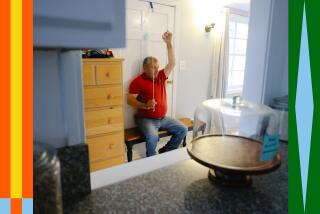Alabama chief justice will face ethics trial in case over same-sex marriage ruling
- Share via
Reporting from Montgomery, Ala. — A state judicial panel on Monday refused to dismiss an ethics complaint against Alabama Chief Justice Roy Moore, saying that Moore will go to trial in September on accusations that he urged 68 probate judges to defy the federal courts on same-sex marriage.
The Alabama Court of the Judiciary, a state panel that disciplines judges, refused dueling requests to either dismiss the complaint against Moore outright or remove him from office. Chief Judge Michael Joiner said the case would go to trial Sept. 28. The panel of nine judges will hear the case and decide whether Moore violated judicial ethics and, if so, what punishment he will face.
The decision came down shortly after the conclusion of a 60-minute hearing in which Moore was alternately portrayed as a politician on a mission to block gay couples from marrying in Alabama or a judge who was merely trying to answer questions from confused probate judges.
Moore — who was ousted from office by the court in 2003 for refusing to remove a Ten Commandments monument from the state judicial building — could be removed as chief justice for a second time.
“We are here to talk about Chief Justice Roy Moore and his repeated refusal to follow the rule of law,” John Carroll, a former federal magistrate representing the Judicial Inquiry Commission, told the court. Carroll said Moore abused his power as chief justice to promote a private agenda against same-sex marriage.
The complaint stems from a Jan. 6 memo he sent probate judges. Moore wrote that a March order from the state Supreme Court to refuse marriage licenses to gay couples remained in full force and effect. The order came even though the U.S. Supreme Court had effectively legalized same-sex marriage nationwide six months prior and a federal judge said Alabama should follow that decision.
A lawyer for Moore said the chief justice was only clarifying the status of the state injunction that was issued in March because probate judges were asking questions about it.
“The probate judges were flapping in the wind. They were wondering what to do,” his lawyer, Mat Staver, told the court. Moore’s order was merely a legal “truism” that the order had not been lifted by the state court, he argued.
Staver, in defending Moore, repeatedly emphasized a section of the January order where Moore told the probate judges that he was not at “liberty to provide any guidance to Alabama probate judges on the effect of [the U.S. Supreme Court ruling] on the existing orders of the Alabama Supreme Court.”
Carroll countered that Moore’s intent was clear: to try to urge probate judges to fight against same-sex marriage.
Moore acted on his own by sending the order after unsuccessfully urging his fellow justices to take some action following the U.S. Supreme Court decision, something pointed out by both sides in the hearing.
The hearing took on some of the theater and spectacle that accompanied the 2003 dismissal with passionate protests outside the court. Moore’s supporters and opponents held dueling rallies outside the court building ahead of the hearing, at times standing within a few feet of one another as they chanted and waved competing signs such as “No Moore” or “Judge Moore is right.”
Moore entered the packed courtroom to applause from his supporters. After the hearing, he spoke to a sign-waving crowd outside, saying there is “no evidence” he broke judicial ethics and that he never told judges what to do.
“They said I tried to influence them. I said it’s their decision,” Moore said.
Moore said the complaint was filed against him by people who “don’t want anybody opposing any agenda of the homosexual movement.”
The Southern Poverty Law Center, a civil rights legal advocacy group, filed the complaint against Moore that led to the ethics charges, and its director said Moore was clearly urging the judges to defy the courts on gay marriage and was now trying to “save his skin by playing word games.”
“Alabama is a great state and deserves better than a chief justice who thinks he is above the law. We’ve said it many times. He acts as if he is the ayatollah of Alabama,” SPLC President Richard Cohen said after the hearing.
Ambrosia Starling, the stage name of a small-town Alabama drag queen, was among the speakers against Moore.
“We lost the war between the states. That means the Supreme Court holds the final authority over jurisdiction of law,” Starling drawled.
Linda Chasom drove three hours from Georgia to attend the rally in support of Moore. She said she thought Moore was being persecuted for his conservative Christian beliefs.
“My family is being persecuted. Judge Roy Moore is part of my family as a believer,” Chasom said.
MORE NATIONAL NEWS
From ‘shrines’ to head-to-toe attire: How Miami is coping with the arrival of Zika
Chicago police shooting video release reflects change in policy, not policing
How being a dad made Obama a feminist
UPDATES:
5:25 p.m.: The story was updated throughout, including information about the September trial.
The story was originally published at 10:20 a.m.
More to Read
Sign up for Essential California
The most important California stories and recommendations in your inbox every morning.
You may occasionally receive promotional content from the Los Angeles Times.










